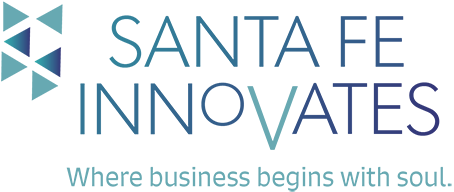Ideas are catalysts for progress, change, and human development in society. In business, ideas spur creativity and innovation. Companies like 3M, Google, and many others encourage (or even require) employees to dedicate 10-20% of their working hours to side projects, personal growth, or idea exploration.
The posts below explore ideas from different perspectives. The first post summarizes our new certificate program for entrepreneurs pursuing early-stage startup ideas. The program explores, iterates, and validates startup ideas to achieve problem-solution fit.
The second post contains excerpts from a podcast with Santa Fe Innovates’ founder, Jon Mertz, in a conversation with Patti Johnson, host of Be a Wave Maker: Conversations on Change Podcast. They explore the best way to pitch ideas and ensure your ideas solve the right problems.
Last Week to Apply to UNM Anderson Certificate Program

Santa Fe Innovates’ certificate program focused on validating business opportunities for entrepreneurs is filling up fast, and registration closes on January 22, 2022. The program is a collaboration between Santa Fe Innovates and UNM Anderson – NM for Good. The five-week program begins Saturday, January 29, 2022, and concludes with an idea pitch on Saturday, February 26, 2022.
Five-Week Program
This program is open to all entrepreneurs, despite the focus on outdoor recreation businesses. The Lean Startup and Lean Canvas concepts and tools are used to validate startup ideas in any business or industry. Anyone with a startup idea can benefit from the online materials, Saturday morning workshops, and Tuesday lunchtime guest presentations. Our experienced mentors will guide, challenge, and help you stay focused on your goals.
This is an early-stage program for entrepreneurs exploring a new startup idea. The emphasis is on exploring, iterating, and validating startup ideas. We begin with a problem-first approach because understanding the customer problem is necessary for developing a viable solution.
We emphasize the importance of business models in the early-stage process. Built with a customer-focused approach, business models are evidence of traction that customers care about your idea. In reality, the business model, not the solution, is the product.
Registration and Program Information
We will accept 15 entrepreneurs, and program registration will close on January 22, 2022. Apply soon!
Read more about the program in our recent blog post
How to Pitch Your Ideas
Santa Fe Innovates’ Jon Mertz talked with Patti Johnson, host of Be a Wave Maker: Conversations on Change Podcast, about pitching ideas and ensuring your ideas solve the right problems. This post highlights segments of this conversation, and the complete episode is available here.
Pitching ideas is necessary for everyone in all walks of life to communicate ideas and perspectives effectively. For entrepreneurs, being able to pitch ideas succinctly is a critical skill because it helps them find investors, attract co-founders, recruit top talent, and refine their ideas.
When asked how he learned to pitch ideas, Jon responded that it really develops through our individual experiences. In his 20s, Jon worked in Washington D.C. for eight years, first for a U.S.Senator and then served in two administrations. He and his government colleagues were very focused on the problems faced by their constituents and how they could solve them.
Whether working in the federal government in his early career or his 20+ years in the tech industry, there were always problems to be solved, and you had to get good at solving problems. To do this, you had to see the connections that underlie the problems and then form solutions. So, regardless of the environment you’re in – startups, government agencies or large corporations – your experiences and observations allow you to see the different ways people approach things and begin to see what works and what doesn’t.
Themes to Pitching Ideas
Jon believes there are a lot of common themes when it comes to pitching an idea in different environments. For example, there were many similarities between government agencies and tech companies in terms of process orientations, how you approach solving problems, or how you build coalitions to get solutions implemented.
There is a strong connection between pitching ideas and solving problems. Everything begins with gaining a clear understanding of problems. Too many entrepreneurs and businesspeople in larger corporate environments focus on their perceived solutions rather than determining the real problems.
Problem-First Approach
Our early-stage program tells our entrepreneurs that taking a problem-first approach is key to successfully starting a new business. Clayton Christensen addressed this in his theory of Jobs To Be Done, or the need to understand what jobs customers are hiring your product to do. Entrepreneurs and business people need to talk to early adopters and potential customers about a solution to understand the real problem. This will likely change the solution, which is a good thing because when you’re in a problem-solving mode, you are testing, iterating, and validating a solution that can solve a specific customers’ problem.
When we work with entrepreneurs, they come in with broad customer segments, but the reality is they need to focus on individuals experiencing a specific problem. If you are not talking to people who write the checks and share the pain points and the real problem, you are unlikely to get any traction with the solution you are developing.
Learning to pitch your idea is a key part of our program curriculum. Our program is focused on how to bring an idea forward. This includes making sure you have the right idea and a business model that can support it. After iterating, refining, and validating your idea, you must be able to present your idea. This is about entrepreneurs building confidence, whether in the pitch or the work leading up to it. Part of this process is gaining confidence in their abilities, understanding of the problem, customer requirements, and knowledge of the competition and market they are targeting.
Find Your Courage!
Entrepreneurs must have the courage to get in front of an audience and clearly articulate their idea in a brief period of time. We wrap up each of our five-week programs with a competitive idea pitch that lasts three minutes for each entrepreneur, followed by three minutes of questions by a panel of judges. Entrepreneurs with the best pitches are recognized as top idea winners.
